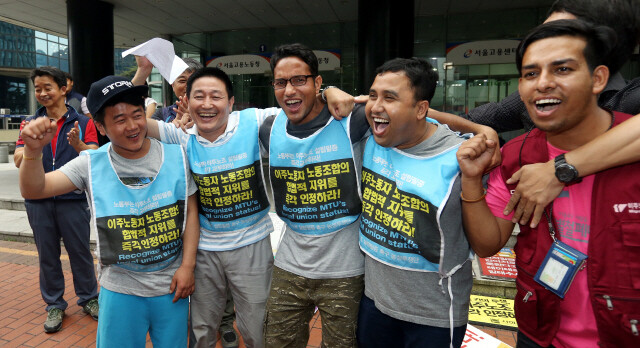hankyoreh
Links to other country sites 다른 나라 사이트 링크
Migrant union finally wins ten-year battle for official certification

On April 24, 2005, around one hundred migrant workers stood in front of the headquarters of the Korean Confederation of Trade Unions to announce the launch of the Seoul-Gyeonggi-Incheon Migrants’ Trade Union (MTU).
“We will fight to improve poor working conditions and guarantee basic labor rights in workplaces where even the Labor Standards Act is a dead letter,” they announced at the time.
But later that year on June 3, the Ministry of Employment and Labor rejected the union’s establishment notice, arguing that “migrant workers illegally residing in South Korea do not have the right to unionize.”
What followed was an arduous decade-long battle in and outside of courtrooms as migrant workers fought to have their rights recognized. It was a period that saw several of the union’s presidents getting deported - including first president Anwar Hossein, the one who read the inaugural declaration.
The Seoul branch of the Ministry of Employment and Labor finally issued its establishment certification to the migrant workers on the morning of Aug. 20. The approval comes nearly two months after a June 25 Supreme Court decision affirming the MTU’s legality.
As he heard the news, a smile spread over MTU President Udaya Rai’s haggard face like an autumn breeze. Rai had been protesting in front of the ministry branch office for over 24 days. The migrant workers next to him, who wore messages on their shirts to demand recognition of the MTU’s legal status, could not hide their delight. Beads of sweat and tears mingled on faces in the midday swelter.
“I want to go and tell all the union members and migrant workers that they can now negotiate with businesses as a legally recognized union,” Rai said.
Upon receiving its certification, the MTU announced that it would “fight throughout the country to break the bonds of slavery for migrant workers exposed to suppression of their human and labor rights through nonpayment of wages, violence, and verbal abuse.” The message is clear: the union plans to write a new chapter in the history of wage and collective agreement negotiations and organization as a legally recognized institution.
The past decade for the MTU has been one not only of fighting the Ministry of Employment and Labor and its denial of South Korea’s three basic labor rights to migrant workers, but also achieving unprecedented depth and breadth in South Korean labor rights.
In 2005, the MTU filed suit to have the ministry’s rejection of its establishment notice overturned. On Feb. 1, 2007, Seoul High Court recognized the union for the first time, overturning a lower-court ruling and insisting that “undocumented migrant workers also deserve to have their rights to labor organization guaranteed.”
But the ministry’s appeal, and the passivity of the Supreme Court, left the case to languish for eight years before a decision - the longest wait in the court’s history.
Even after the Supreme Court’s decision, the ministry continued to order changes to the MTU’s regulations arguing that phrasing about “fighting to abolish the training system and gain legal status for migrant workers” suggested the union’s goal was “political campaigning.”
Indeed, the union only received its certification after changing the phrasing in question to read “working to improve labor conditions for migrant workers and elevate their politics, economic social, and cultural standing.”
By Kim Min-kyung, staff reporter
Please direct questions or comments to [english@hani.co.kr]

Editorial・opinion
![[Editorial] Penalties for airing allegations against Korea’s first lady endanger free press [Editorial] Penalties for airing allegations against Korea’s first lady endanger free press](https://flexible.img.hani.co.kr/flexible/normal/500/300/imgdb/original/2024/0502/1817146398095106.jpg) [Editorial] Penalties for airing allegations against Korea’s first lady endanger free press
[Editorial] Penalties for airing allegations against Korea’s first lady endanger free press![[Editorial] Yoon must halt procurement of SM-3 interceptor missiles [Editorial] Yoon must halt procurement of SM-3 interceptor missiles](https://flexible.img.hani.co.kr/flexible/normal/500/300/imgdb/child/2024/0501/17145495551605_1717145495195344.jpg) [Editorial] Yoon must halt procurement of SM-3 interceptor missiles
[Editorial] Yoon must halt procurement of SM-3 interceptor missiles- [Guest essay] Maybe Korea’s rapid population decline is an opportunity, not a crisis
- [Column] Can Yoon steer diplomacy with Russia, China back on track?
- [Column] Season 2 of special prosecutor probe may be coming to Korea soon
- [Column] Park Geun-hye déjà vu in Yoon Suk-yeol
- [Editorial] New weight of N. Korea’s nuclear threats makes dialogue all the more urgent
- [Guest essay] The real reason Korea’s new right wants to dub Rhee a founding father
- [Column] ‘Choson’: Is it time we start referring to N. Korea in its own terms?
- [Editorial] Japan’s rewriting of history with Korea has gone too far
Most viewed articles
- 160% of young Koreans see no need to have kids after marriage
- 2[Editorial] Japan’s rewriting of history with Korea has gone too far
- 3Vietnamese war victims speak of sexual violence by S. Korean troops for the first time
- 4For survivor, Jeju April 3 massacre is a living reality, not dead history
- 5[Column] Park Geun-hye déjà vu in Yoon Suk-yeol
- 6[Reporter’s notebook] In Min’s world, she’s the artist — and NewJeans is her art
- 7[Editorial] Penalties for airing allegations against Korea’s first lady endanger free press
- 8Presidential office warns of veto in response to opposition passing special counsel probe act
- 9Hybe-Ador dispute shines light on pervasive issues behind K-pop’s tidy facade
- 10[Special Feature Series: April 3 Jeju Uprising, Part III] US culpability for the bloodshed on Jeju I